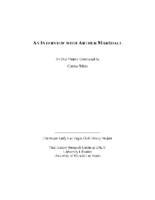Search the Special Collections and Archives Portal
Search Results

Jack L. Monroe Jr. interview, March 15, 1981: transcript
Date
Archival Collection
Description
On March 15, 1981, Marie Carmichael interviewed Jack L. Monroe Jr. (b. 1937 in St. Helena, California) about his life in Las Vegas, Nevada and his work as a cook among many other topics. Monroe speaks initially about his time working alongside his family in the restaurant business, with his father working as a cook, his mother a waitress and himself as both a busboy and a cook. He discusses the working conditions of cooks, the competition between casino restaurants and the relationship between workers, bosses and the public. Moreover, Monroe speaks about life in Las Vegas as a youngster, the significance of YMCA, summer camps and other recreational activities, and the school system. Lastly, he talks about the changing infrastructure of the city, the paved roads and public transportation, how casinos made their profits and the attachment residents develop towards the city of Las Vegas.
Text

Transcript of interview with Lawrence Canarelli by Claytee White, May 1, 2016
Date
Archival Collection
Description
“At five years old, I was the youngest boy at the orphanage. This was the first time that I had lived with indoor plumbing and indoor showers.” To describe award-winning home builder Larry Canarelli as a self-made man is to grossly understate his accomplishments and his determination. Canarelli, founder of American West, Nevada’s largest privately owned development company, learned all about living without shelter as a very young boy. When he was nine years old, Canarelli, the second of his mother’s six children, encouraged his veteran stepfather to buy the family’s first permanent house for $80 down and an agreement to assume payments on the Veterans Administration loan. As his school peers dreamt of large, shiny cars, Canarelli envisaged big, beautiful houses. After self-funding his education, graduating from the University of California Los Angeles, completing two years of U.S. Army service, and earning his Master’s degree from University of Southern California, Canarelli began his career working with a large home building firm in the Los Angeles area. Three years later he switched firms, and the new company sent him to Las Vegas. In this interview, Canarelli reaches back to his childhood to explain his motivation to build houses: “All of my life, I had an interest in housing. Perhaps this is because of never having a house when I was younger.” He recalls how the Collins Brothers helped him when he founded American West. He describes the Southern Nevada “shelter market” of the 1970s and follows its evolution in style and marketing through the 1980s and 1990s; he talks about master planning and the builders who first master planned their Clark County developments: Pardee Homes in Spring Valley, American Nevada in Green Valley, and Howard Hughes Corporation in Summerlin. He speaks to the influences of interest rates and available land on housing prices; the importance of environmentally responsible housing; where the entry-level housing market will go, and ways that technology has changed home building and home buying. And throughout, he exemplifies his devotion to, knowledge of, and respect for Southern Nevada’s housing industry-its builders, its market, and its buyers.
Text

Transcript of interview with Hazel Hedges by Irene Rostine, October 29, 1997
Date
Archival Collection
Description
Interviewed by Irene Rostine. Hazel Hedges moved from Kansas City to Las Vegas with her husband and son in 1952. She worked briefly as a waitress in the dining room at the Thunderbird and then became a stay at home mom until her son was in junior high. Then after she went to real estate school, she went to work in commercial real estate at Bond Realty. After that, she passed her brokers exam and transferred to Parkway Realty where she sold land. Her primary success in real estate came from selling houses and investing in land and residential properties personally. After leaving Parkway Realty, Hazel went to work for the real estate office Deshoor, Fair, and Davis, which she eventually bought and renamed Southside Realty. Eventually her son joined her, and they operated Hedges and Wade Realty with two offices, one on each side of town. Hazel also did volunteer work including the Assistance League Las Vegas' Operation School Bell Program, which provides clothing for area school children in need.
Text

Chester Hodson interview, March 4, 1981: transcript
Date
Archival Collection
Description
On March 4, 1981, collector Marlene L. Larson interviewed Chester Albert Hodson, Jr. (born December 21st, 1948 in Las Vegas, Nevada) at the Sizzler restaurant in Las Vegas, Nevada. In this interview, Mr. Hodson speaks about working in the restaurant industry in Las Vegas, as well as his father’s experience working in the industry. He also talks about living in Las Vegas and the changes he has seen throughout his life.
Text

Transcript of interview with Arthur "Art" Marshall by Claytee D. White, February 11, 2014
Date
Archival Collection
Description
Interview with Arthur "Art" Marshall by Claytee White on February 11, 2014. In this interview, Marshall
Arthur Marshall was born in 1929 in Cleveland, Ohio. He met his wife, Jayn in 1953, and the couple moved to Las Vegas where she already lived with her family. Art joined his father-in-law in the family's retail clothing business. Art Marshall took over the retail clothing business with his brother-in-law, Herb Rousso, and expanded operations as Marshall-Rousso stores. Art quickly became very active in the Jewish community upon arriving in Las Vegas. He served as president at Temple Beth Sholom, and worked with other Jews in the city, many who owned and managed the hotels at the time, to build a strong Jewish community in Las Vegas. He served as the chairman of Nevada State Bank and spent 12 years on the Nevada Gaming Commission.
Text

Transcript of interview with Arne Rosencrantz by Claytee White, February 9, 2010
Date
Archival Collection
Description
In this interview, focused on the John S. Park neighborhood of Las Vegas, Arne Rosencrantz discusses his childhood growing up in Las Vegas. He talks about local businesses, including his father's furniture store, as well as schools and churches in the neighborhood.
Arne Rosencrantz remembers living on Beverly Way from 1954 to 1970. Like so many others from that era, he attended Fifth Street School, John S. Park Elementary School, John C. Fremont Middle School and graduated from Las Vegas High School. As a Jew, he was in a small minority, but fondly recalls growing up in the dense Mormon population of John S. Park Neighborhood. As a youngster, life in Las Vegas was filled with fun. The desert provided opportunity to hunt lizards and rabbits. Kids walked to school without concern. They played ball and found the Strip casinos welcoming to locals. He tells how the social issue of segregation of the 1960s did not affect him personally, but how local movie theatre owner Lloyd Katz fought to make his Huntridge and Fremont theatres integrated. He also reminisces about his father opening Hollywood Furniture and later Garrett's Furniture, which Arne operated until retiring in 2001. During the interview, he lists other furniture companies and the strong assortment of other retailers and restaurants that served the neighborhood.
Text

Transcript of interview with Adele Baratz by Steve McClenachan, March 3-4, 1979
Date
Archival Collection
Description
Interview with Adele Baratz by Steve McClenachan on March 3 and 4, 1979. In this interview, Baratz talks about growing up in Las Vegas and her her schooling. She graduated from Las Vegas High School in 1944, and discusses the rationing that took place during World War II. She went to Maryland for nursing school and returned to Las Vegas in 1947. She describes some of the hotels and casinos, and tells the story of her father trading property for an automobile in 1935. She also recalls the building of Hoover Dam, swimming in local pools, and going to Mount Charleston in the winter. The interviewer asks her about travel between Las Vegas and California and the impact of Atlantic City on Las Vegas tourism. Baratz then talks about her nursing career and starting a re-certification program in 1974 and the different hospitals in the area.
Text

Transcript of interview with Jacque Dvorak by Barbara Tabach, March 09, 2017
Date
Archival Collection
Description
Jacque Dvorak was born in London, England, in 1944. Two years later, her family immigrated to Canada and then in 1953 they fulfilled their dreams to reside in the United States. The Dvorak family settled in Long Beach, California where Jacque?s brother was born. In 1957, the Dvorak family relocated to Las Vegas when Jacque?s father, Sam, opened a 24-hour barbeque restaurant in Market Town with his brother Harry. While growing up in California, Jacque enjoyed dancing and being on stage. She found herself drawn to performance much like her mother, Irene, who was an entertainer in Great Britain. This enthusiasm served her well in her future retail career which included the opening of the MGM. Jacque attended Las Vegas High School and graduated in 1962. Taking full advantage of being a teenager in Las Vegas, Jacque remembers the days when the need to lock your doors didn't? exist. Though, Jacque describes being keenly aware of being Jewish and forming strong bonds within the Jewish community through BBYO and other Jewish organizations. She also recalls protesting during school prayer recitations in the 1960s. In this interview Jacque gives an insider?s perspective of growing up in Las Vegas and Jewish life in the city. Her stories range from tales of teenage fun to dealing with modern anti-Semitism in Las Vegas to the joy she has found in friendships in the community. Jacque has two children, Harry Fagel and Lisa Sokoloski.
Text

Transcript of interview with Arne Rosencrantz by Barbara Tabach, February 18, 2015
Date
Archival Collection
Description
Arne Rosencrantz is the former president and owner of Garrett's Furniture in Las Vegas, Nevada. Rosencrantz was born on September 27, 1947 in Longview, Washington. He moved to Las Vegas in 1952 and attended Nevada Southern University, now known as the University of Nevada, Las Vegas (UNLV). In 1967, Rosencrantz began working at Garrett's Furniture, and in 1979, he purchased the company and became its president. He was president of the Jewish Federation of Las Vegas from 1987 to 1988, and also served as a campaign chairman for the Federation and chairman of its Young Leadership Program. In this interview, Rosencrantz shares his grandparents and father?s immigration story, which took them from Russian to Portland, Oregon. He also talks about moving to Las Vegas, his childhood experiences, especially within the Jewish community, and reflects on the growth of his family?s furniture business in the city. Rosencrantz has been highly involved in the Jewish community over the decades, including the Young Leadership Program, United Jewish Appeal, Temple Beth Sholom, and the Jewish Federation. He is married to Lynn Rosencrantz and has two children, Marcus and Amy.
Text

Transcript of interview with Jim Marsh by Claytee D. White, June 5, 2012
Date
Archival Collection
Description
Jim Marsh in Denver, Colorado. Father was the chief for the Colorado Patrol. Mother lived in Nebraska. Jim split time in both places while growing up. He was a service member of the Army and once getting out of the service he started his work with his father at a Ford dealership. Jim went on to work and own dealership in several different areas, Colorado, California, New Mexico, and Washington states before arriving in Las Vegas, NV in 1971. Once arriving in Las Vegas Marsh purchased a dealership called American Auto Mart. Around 1976 Jim Marsh bought the Santa Fe Saloon along with the twenty lots surrounding it for 12,500. This was his first experience in the gaming industry Marsh was the only dealership in the world for 25 years to have a gaming license in a new-car dealership. Marsh discovered interest in Belmont when there was a lone resident Rose Walter. The two bartered and Jim gained land in Belmont and went on to build a bar and church for the town. Marsh eventually went on to own the Skyline Casino. Jim Marsh founded the Nevada Auto Auction in 1987 on Las Vegas Boulevard South Eventually sold it and used the investment to build the Longstreet Casino. Marsh was' also a member of business organizations, Better Business Bureau and The Red Cross Marsh has been a member of the Salvation Army Advisory Board for at least 25 years. Tonopah is another location that Marsh has invested in. After leasing the gaming at the Mizpah Hotel to later buying the Valley Bank building and moving the gaming from Mizpah. It is still successful today. He also purchased the Tonopah Station House which is a hotel bar, and restaurant; along with owning the grocery store Scolari's next-door. Tonopah has proved to be a very good investment for Jim Marsh.
Text
